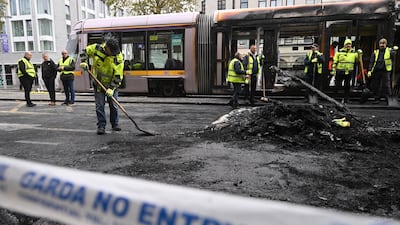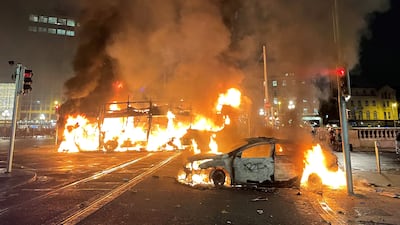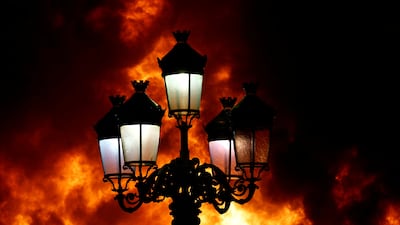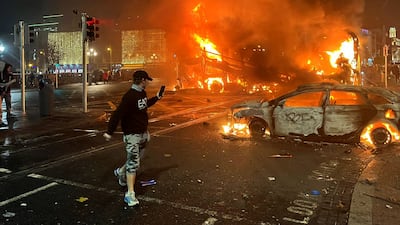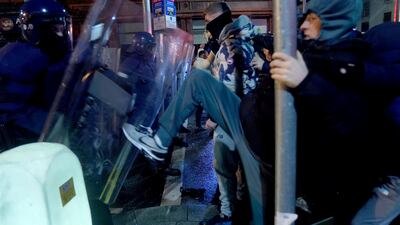The island of Ireland, where the stabbing of three children outside a Dublin primary school last week led to rioting, is beautiful, often troubled and historically a great exporter of people.
Definitions vary but the Irish diaspora numbers between an official estimate of three million, born in Ireland but residing overseas, and an astonishing 100 million, the higher figure covering everyone of known Irish ancestry scattered around the world. Ireland's population, even taking account of Northern Ireland, part of the UK, stands at just seven million.
Irish people driven abroad, for reasons ranging from famine – the devastating “Great Hunger” of the mid-19th century – to a desire for better lives, have not always been warmly welcomed. No Irish Need Apply, one of countless songs of emigration, provokes animated debate on the true extent of the title’s discriminatory use in job adverts in the US, but accurately reflects a handed-down perception embedded in the national consciousness.
The Irish, therefore, would surely be the last people on Earth to treat newcomers with suspicion or resentment. But let us consider what triggered the burning, looting and attacks on police and firefighters seen in Dublin a few hours after a man lunged at the children, leaving one five-year-old fighting for her life and a carer who intervened seriously hurt. Fuelled in part by social media, where the attacker was quickly described as an Algerian immigrant (in fact, some reports suggest he has been in Ireland for many years and has Irish nationality), hundreds of rioters trashed the heart of their city in a display – it is said – of anti-immigration sentiment.
“Ireland is Full” and “Irish for the Irish”, banners read. Targets of mob rage included a hotel where migrants are housed. For Drew Harris, head of Ireland’s police force, the disorder was the work of a "lunatic, hooligan faction driven by a far-right ideology". The Taoiseach (prime minister), Leo Varadkar, accused rioters of bringing "shame on Dublin, shame on Ireland and shame on their families and themselves".
By unfortunate coincidence, these events closely followed the results of the Netherlands general election showing the party with the most seats to be the one led by Geert Wilders, whose loathing of Muslims reaches depths that make France’s Marine Le Pen seem, comparatively, a cheerleader for inclusive society. His Freedom Party is way short of an overall parliamentary majority but the thirst for power common to all political groupings may yet see him installed as prime minister after the coming weeks, maybe months of coalition talks.
The juxtaposition of grim developments in two seemingly calm, liberal EU states has not gone unnoticed, leaving the pro-Europe, anti-racist left and centre wringing their hands in despair while the right and far right make no secret of their “told you so” self-satisfaction.
Enter the fray one Conor McGregor, 35, a martial arts and boxing champion with a fistful of titles and an even longer list of clashes with authority that have landed him repeatedly before the courts. Mr McGregor is something of a folk hero among those who blame immigration for all Ireland’s ills.
At first, he seemed almost ambivalent about the fury sparked by the stabbing. Having already reacted to other events by saying Ireland was “at war”, he won the dubious support of Paul Golding, leader of Britain’s far-right Britain First movement.
The Irish fighting man soon moderated his tone. “I do not condone last night’s riots,” he tweeted to his 10.3 million followers. “I do not condone any attacks on our first responders in their line of duty. I do not condone looting and the damaging of shops.
“Last night’s scenes achieved nothing towards fixing the issues we face. I do understand frustrations however …
“There will be change in Ireland, mark my words. The change needed. In the past month, innocent children stabbed leaving school. Ashling Murphy murdered. Two Sligo men decapitated. This is NOT Ireland’s future! If they do not act soon with their plan of action to ensure Ireland’s safety, I will.”
The incidents he cited were presented as if interlinked. Ms Murphy, 23, a gifted musician and teacher, was murdered in a random attack beside a canal outside the town of Tullamore in 2022. Her killer, Jozef Puska, 33, a Slovak Romani migrant, was sentenced to life imprisonment this month by a judge who regretted he could not impose a “whole life” tariff. In October, Yousef Palani, 23, born in Iraq but living in Ireland since he was six, was jailed for life for murdering two men in the western city of Sligo after using a dating app to target homosexual men, also in 2022.
One interpretation is that the Dublin rioters haven’t the intelligence to realise those responsible for these evil but unrelated acts are no more representative of their ethnic origins or communities than Irish nationals convicted of crime in other countries or, indeed, Ireland. Those with an anti-foreigner outlook must be bitterly disappointed that a Brazilian food delivery worker and a French student, as well as the school carer, played crucial roles in disarming and stopping the knife-wielding assailant.

Mr McGregor wanted it both ways. He called the knifeman a “mentally deranged non-national” and retweeted a video showing a black “migrant” looter. On the other hand, he saluted the children’s Brazilian defender, Caio Benicio, acknowledging his contribution to society and offering an indefinite invitation to eat free at his Dublin pub.
While hatred and hypocrisy clearly lay chiefly behind the disturbances, disenchantment with authority is also commonplace in Ireland.
A week before the Dublin stabbing, a wedding anniversary took me to a hotel very close to where it took place and trouble later began. During this short visit, it was hard to miss the wide disparity between the haves and the have-nots. In a smart department store, two young and expensively dressed women were pondering the purchase at least one Chanel handbag costing thousands. Outside, beggars – by no means all foreigners – sat in shop doorways, sometimes only a few apart, pleading for money. There is much poverty in poorer quarters, a far cry from the boom era of the Celtic Tiger, and gangs are said to be increasingly mobile.
The issues confronting Ireland mirror those faced in Britain and continental Europe, including of course the Netherlands. Seeking firm but humane control of borders is not, in itself, a far-right attitude. But the complacency and apparent impotence of mainstream politicians has encouraged some to turn for solutions to populist demagogues. Men like Mr McGregor and Mr Wilders come to be seen as promising options however questionable their characters.
There is some reassurance, however. The far right remains weaker in Ireland than in the US, Britain and certain EU countries. Sean, an Irish member of a foreign language conversation group I attend in London, emphasised the point some of his compatriots cannot see. “I’m no fan of McGregor,” he told me. “To be honest, the Irish are not in a great position to complain about immigration given how we’ve imposed ourselves around the world.” And crowdfunding for those affected by the school attack, and the have-a-go passers-by whose interventions prevented an even more tragic outcome, have raised hundreds of thousands of euros.
